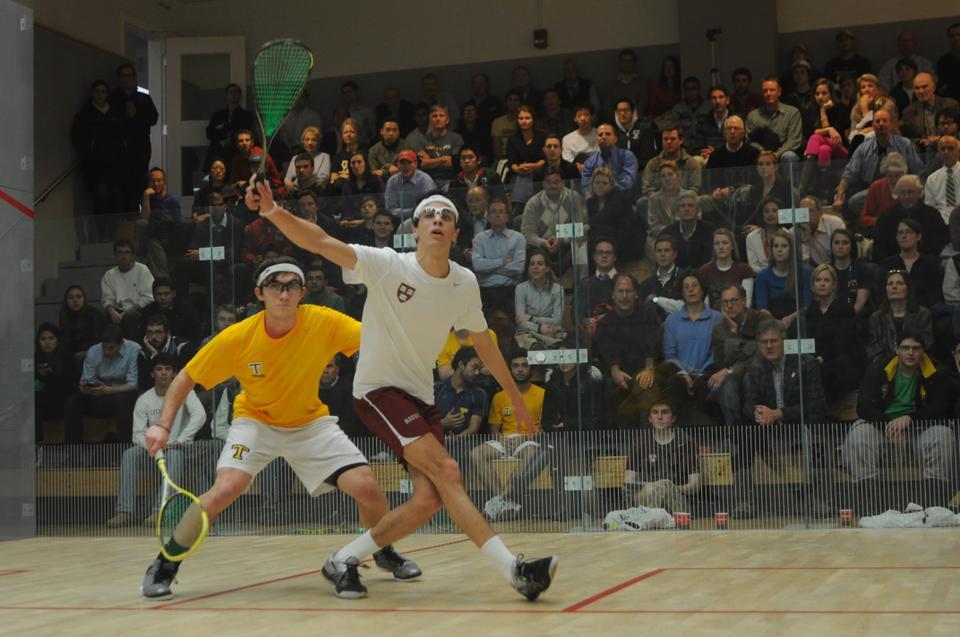
News
Summers Will Not Finish Semester of Teaching as Harvard Investigates Epstein Ties

News
Harvard College Students Report Favoring Divestment from Israel in HUA Survey

News
‘He Should Resign’: Harvard Undergrads Take Hard Line Against Summers Over Epstein Scandal

News
Harvard To Launch New Investigation Into Epstein’s Ties to Summers, Other University Affiliates

News
Harvard Students To Vote on Divestment From Israel in Inaugural HUA Election Survey
Farag Comes Up Short in Title Defense

Five Crimson squash players competed in this weekend’s men’s CSA Individual Championships at Trinity College in Hartford, Conn., No. 2 seed junior Ali Farag was unable to defend his national title, losing in the semifinals to eventual champion No. 3 seed Amr Khaled Khalifa of St. Lawrence University. For the fourth year in a row, the national championship went to a competitor in his first season at the collegiate level.
After upsetting Princeton 5-4 in the CSA Potter Cup semifinals on Feb. 19, the Crimson lost in the title match against top-ranked Trinity, 6-3. After similarly falling in the team championship last year, Harvard was redeemed by Farag’s individual title.
“Obviously we are annoyed we lost to Trinity,” freshman Sam Goldberg said. “We think we can [win], we know we can [win]. But with the Princeton match as an example, even when Ali [Farag] lost, other people stepped up.”
Last year as a sophomore transfer student from American University in Cairo, Farag, the number one ranked junior in the world, finished the season with a perfect 16-0 record, including a 3-0 (12-10, 11-8, 11-4) victory over Columbia’s Ramnit Tandon in the finals.
This year, four Crimson players, Farag and fellow juniors Brandon McLaughlin, Nigel Koh, and Gary Power, competed in the Pool division, the top bracket at the tournament. Junior Tommy Mullaney competed for the Molloy Cup.
On the first day in Pool play, Farag won his first two matches against Michael Sunderland of Cornell in three games, 11-9, 11-9, 11-8, and Princeton’s Samuel Kang in four, 11-8, 9-11, 11-9, 11-9. Power lost in the first round to Kang in straight sets, 13-11, 14-12, 11-8. Koh faced a similar fate in the first round, losing, 11-8, 13-11, 11-8.
McLaughlin was the only other Crimson player to win in the first round, beating Dylan Ward of Princeton 3-0, 11-2, 11-2, 11-4, to move into the round of 16. He proceeded to lose to eventual champion Khalifa in straight sets, 12-10, 11-3, 11-5.
On the second day of competition Farag got off to a rough start, dropping his first game against Rochester’s Andres Duany, 11-9, before winning three games in a row, 11-1, 11-6, 11-8. However, he was foiled in the next round against fellow Egyptian Khalifa.
The match came down to the wire, going to five games. Farag jumped out to a two-game lead, winning 11-9 and 11-3. Yet Khalifa battled back to even up the match, 11-7, 11-6. With a spot in the title match on the line, the pair battled back and forth, until Khalifa pulled away to a 13-11 victory in the fifth game. Khalifa went on to win against top-seeded Todd Harrity of Princeton 3-0 in the finals.
Although Farag was the lone member of the Crimson who remained in the championship bracket, Gary Power competed in the first round consolation quarterfinals and Brandon McLaughlin was in the second round consolation round of 16. Power dropped a 3-1 decision to Adam Perkiomaki of Rochester. McLaughlin suffered a similar fate, losing to Dartmouth’s Chris Hanson 3-1.
In the Molloy division, Mullaney was ousted in the quarterfinals by Princeton’s Vivek Dinodia in straight sets.
“As our coach always says, we are basically the same team as last year, with a few additions,” Goldberg said. “The thing that is so different about our team this year from last year, is that we are more mature.”
Harvard closes out the season as the No. 2 team in the country while claiming a share of the Ivy League title for the first time since 2006. All five of the competitors in the CSA individual championships are juniors and will return next year.
“Obviously [next year], with our captains leaving, there is going to be a different mentality, but we feel that if we can go in with the same intensity or maturity that we will be a force to be reckoned with next year,” Goldberg said. “Teams are going to be afraid to play us.”
—Staff writer Jacob W. Lynch can be reached at jacoblynch@college.harvard.edu.
Want to keep up with breaking news? Subscribe to our email newsletter.
